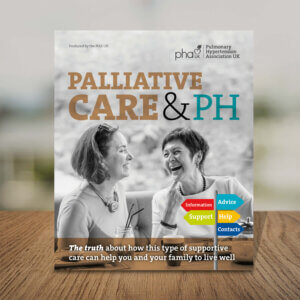“A friend has suggested I look into palliative care, but my specialist centre has never mentioned it to me. Does that mean I’m not eligible for it? What should I do?”
PHA UK support nurses Paul Sephton and Sian Richardson say:

Palliative care, also known as supportive care, can make a huge difference to quality of life – so it’s really positive that your friend has brought this up with you.
We have both worked in palliative care and in hospices, as well as being clinical nurse specialists in PH during our nursing career.
Palliative care is all about living well, and that’s a really important thing for people to understand.
Please be reassured that just because your specialist centre hasn’t mentioned it to you, it doesn’t mean you are not eligible for this type of supportive care – or that it wouldn’t help you.
There are still lots of misconceptions about palliative care, with some patients believing it is only about dying. And research supported by the PHA UK has shown that for many healthcare professionals, the experience of receiving negative reactions from patients when discussing palliative care sometimes stopped them bringing up the topic earlier.
The 2019 report by Dr Sarah Woolcock, tiled Exploring the delivery of Palliative and End-of-Life Care in Patients with Pulmonary Arterial Hypertension : A Qualitative Interview Study summarised that ‘fear of such negative reactions was often a barrier to broaching the topic of palliative care with patients. Staff feared removing hope from the patients as well as they themselves being perceived as giving up on the patient. The implication of these experiences for clinical practice is that many staff delay introducing palliative care for fear of how the patients may react, thus reinforcing the negative perceptions of patients’.
However, the same research also showed that healthcare professionals would welcome the patient bringing the topic of palliative care up themselves. So, our advice would be to bring this up with your Clinical Nurse Specialist (CNS), either at your next appointment, or by contacting them in the usual ways (you do not need to wait until you have an appointment).
Once you have spoken to your CNS, one of two things are likely to happen. Your nurse may liaise with a doctor within the PH service, who will write to your GP to request that you are referred to your local palliative care services. In some cases, the CNS will be able to make the referral themselves.
Once it has been confirmed that you have been referred to your local palliative care services, there may be a wait until you then hear directly from them.
This is because they will be considering the referral, and which palliative care services are most appropriate, to ensure you receive the best possible care.
It is important to understand that palliative care encompasses many different things and there are lots of different ways of accessing it. For example, you might be surprised to know that district nurses deliver generalist palliative care (visiting patients in their homes) and they are really good at it.
Hospice care is one part of this type of supportive care. In-patient hospice care is part of what’s known as ‘acute’ care, and this can be for things like symptom management.
Hospices also offer holistic care, often through what’s commonly known as ‘living well’ services, and this can include things like counselling support, complementary therapies such as reflexology, and activity-based group sessions. These services often involve attending hospices for the day, as part of a six-or-eight-week programme.
If palliative care hasn’t already been brought up with you, then it is likely that this type of holistic care is what will be most appropriate for you at this time.
Regionally there are other palliative care services available, but they vary around the UK so it is something you will need to speak to your team about.
If you would like to discuss palliative care, or you have questions about what it entails, or how to access it, here at the PHA UK we would be very happy to talk to you.
Please email us at support@phauk.org or call 0300 373 5367 (if there is no answer, please leave a message and we will call you back as soon as we can. This may be a few days later but please be assured we will respond!)
In some cases, because we are both still registered nurses, we are able to refer people who contact the PHA UK to palliative care services. However, this depends on circumstances, and for data protection reasons we are unable to access clinical information from your centre, so please contact us for an initial discussion. We also need the consent from your own GP to process any palliative care referral we complete.
To summarise, please do not be afraid to bring up palliative care with your specialist team, or with us if you would prefer. This type of supportive care can make such a difference to people living with pulmonary hypertension.
Paul and Sian x
- PHA UK Support Nurses Paul Sephton and Sian Richardson are former Clinical Nurse Specialists in PH, with long careers in the NHS.
Free PHA UK guide
With advice from experts and real experiences from people with PH, Palliative Care & PH aims to challenge misconceptions and help you understand more about this type of supportive care. The guide also includes a separate Anticipatory Care Plan booklet, tucked inside the back cover, to help you plan for the future. Order for free by clicking here.

















